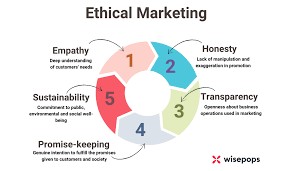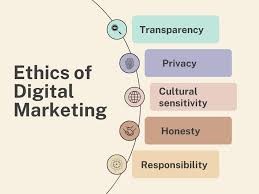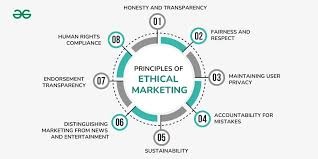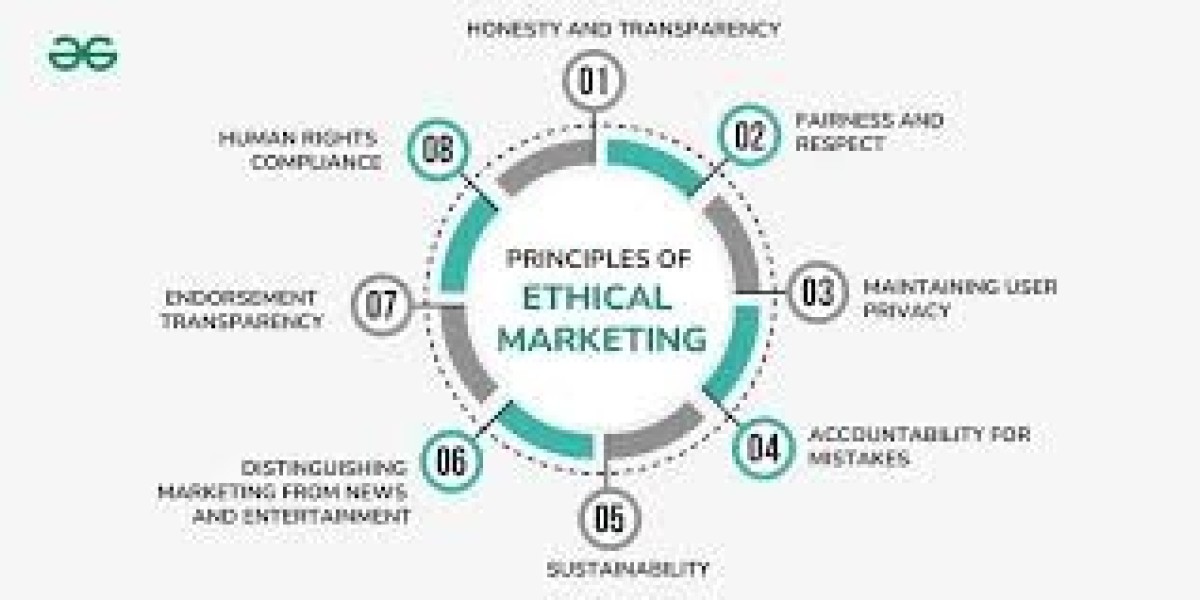Introduction
Digital marketing has transformed how businesses connect with their audiences. With the rise of online platforms, marketers have unprecedented tools to engage potential customers. However, with this power comes the responsibility to conduct marketing activities ethically. Ethical digital marketing is essential for building trust, fostering long-term relationships, and maintaining a positive brand image. This blog explores the principles of ethical digital marketing and provides best practices for responsible marketing.

Understanding Ethical Digital Marketing
Definition of Ethical Digital Marketing
Ethical digital marketing refers to the practice of promoting products and services through digital channels in a way that is honest, transparent, and respectful to consumers. It involves adhering to ethical guidelines and principles that ensure marketing activities are conducted with integrity.
Importance of Ethics in Digital Marketing
Ethical digital marketing is crucial for several reasons:
- Trust and Loyalty: Ethical practices build consumer trust and foster loyalty. Customers are more likely to return to and recommend brands they perceive as honest and transparent.
- Brand Reputation: Maintaining ethical standards enhances a brand's reputation and differentiates it from competitors who may engage in deceptive practices.
- Legal Compliance: Adhering to ethical guidelines helps businesses comply with legal regulations, avoiding potential fines and legal issues.
- Sustainable Growth: Ethical marketing practices contribute to sustainable business growth by establishing long-term relationships with customers.
Principles of Ethical Digital Marketing
Transparency
Transparency is a cornerstone of ethical digital marketing. It involves being open and honest about the products, services, and practices of the business. Key aspects include:
- Clear Information: Provide clear and comprehensive information about products and services. Avoid hiding important details in fine print.
- Disclosure: Disclose any affiliations, sponsorships, or partnerships. Let customers know if content is sponsored or if there are any conflicts of interest.
- Data Usage: Be transparent about how customer data is collected, used, and protected. Obtain explicit consent for data collection and usage.
Honesty
Honesty is essential in all marketing communications. It ensures that customers receive accurate information, which helps build trust and credibility. Important practices include:
- Truthful Claims: Make sure all claims about products or services are truthful and can be substantiated. Avoid exaggerations and false promises.
- Genuine Testimonials: Use authentic customer testimonials and reviews. Avoid fabricating or manipulating reviews to mislead potential customers.
- Accurate Representation: Ensure that images, videos, and descriptions accurately represent the product or service. Avoid using misleading visuals that could deceive customers.
Respect for Privacy
Respecting customer privacy is a key ethical principle in digital marketing. It involves protecting personal information and respecting the preferences of customers. Key practices include:
- Data Protection: Implement robust security measures to protect customer data from breaches and unauthorized access.
- Consent: Obtain explicit consent before collecting, storing, or using personal data. Allow customers to opt out of data collection and marketing communications.
- Minimal Data Collection: Collect only the data that is necessary for marketing purposes. Avoid unnecessary data collection that could compromise privacy.
Best Practices for Responsible Content Marketing
Creating Valuable Content
Creating valuable content is fundamental to ethical content marketing. It involves providing information that is useful, relevant, and engaging to the target audience. Best practices include:
- Informative Content: Focus on creating content that educates, informs, and addresses the needs and interests of the audience.
- Quality Over Quantity: Prioritize quality over quantity. Ensure that each piece of content is well-researched, accurate, and adds value to the audience.
- Audience-Centric: Tailor content to the preferences and interests of the target audience. Understand their pain points and provide solutions through content.
Avoiding Misleading Information
Avoiding misleading information is crucial to maintaining trust and credibility. Best practices include:
- Fact-Checking: Verify all information and statistics used in content. Ensure that data is sourced from reputable and reliable sources.
- Clear Distinctions: Clearly distinguish between opinion and factual information. Avoid presenting opinions as facts.
- Honest Communication: Be honest about the limitations and potential drawbacks of products or services. Provide a balanced view to help customers make informed decisions.
Proper Attribution
Proper attribution is essential to maintain ethical standards in content marketing. It involves giving credit to original sources and respecting intellectual property rights. Best practices include:
- Citing Sources: Cite all sources of information, quotes, and data used in content. Provide links to original sources where possible.
- Avoiding Plagiarism: Create original content and avoid copying or paraphrasing content from other sources without proper attribution.
- Licensed Media: Use licensed images, videos, and media in content. Ensure that proper credit is given to creators and that usage rights are respected.
Ethical SEO and Optimization Techniques
White Hat SEO Practices
White hat SEO practices are ethical techniques used to improve search engine rankings without violating guidelines. Best practices include:
- Quality Content: Focus on creating high-quality, relevant, and engaging content that provides value to the audience.
- Relevant Keywords: Use relevant and targeted keywords naturally within the content. Avoid keyword stuffing or using irrelevant keywords to manipulate rankings.
- Organic Backlinks: Build organic backlinks through genuine collaborations and partnerships. Avoid buying or manipulating backlinks to improve rankings.
Avoiding Black Hat Techniques
Avoiding black hat techniques is essential to maintain ethical SEO practices. These techniques can lead to penalties and damage the brand's reputation. Best practices include:

- No Cloaking: Do not use cloaking techniques to show different content to search engines and users.
- Avoid Link Farms: Stay away from link farms and schemes designed to artificially boost backlinks.
- No Hidden Text: Avoid using hidden text or links to manipulate search engine rankings. Ensure that all content is visible and accessible to users.
User Experience Optimization
User experience optimization involves creating a seamless and enjoyable experience for website visitors. Best practices include:
- Accessible Design: Ensure that the website is accessible to all users, including those with disabilities. Use alt text for images and provide transcripts for videos.
- Easy Navigation: Design a user-friendly website with clear navigation and easy-to-find information. Reduce clutter and ensure that important information is easily accessible.
- Fast Load Times: Optimize website load times to enhance user experience. Compress images, use caching, and minimize code to improve speed.
Social Media and Ethical Engagement
Authentic Interactions
Authentic interactions on social media build trust and foster meaningful relationships with the audience. Best practices include:
- Genuine Engagement: Engage with followers in a genuine and honest manner. Respond to comments, messages, and inquiries promptly and authentically.
- Avoid Automation: Avoid using automated responses and bots for social media interactions. Personalize interactions to make them more meaningful.
- Community Building: Foster a sense of community by encouraging discussions, sharing user-generated content, and recognizing loyal followers.
Handling Negative Feedback
Handling negative feedback professionally and constructively is crucial for maintaining a positive brand image. Best practices include:
- Professional Responses: Respond to negative feedback professionally and calmly. Avoid defensive or confrontational language.
- Address Issues: Address the concerns raised by customers and provide solutions where possible. Use negative feedback as an opportunity to improve products and services.
- Transparency: Be transparent about any mistakes or issues. Acknowledge them openly and explain the steps taken to rectify the situation.
Influencer Collaborations
Collaborating with influencers can be an effective marketing strategy if done ethically. Best practices include:
- Disclosure: Ensure that influencers disclose any paid partnerships or sponsorships. Transparency is key to maintaining trust with the audience.
- Alignment with Values: Collaborate with influencers who align with the brand's values and mission. Avoid influencers who engage in unethical practices.
- Authentic Endorsements: Ensure that influencer endorsements are genuine and not misleading. Influencers should only promote products they genuinely use and believe in.
7. Data Privacy and Security in Digital Marketing
Collecting Data Responsibly
Responsible data collection is essential for maintaining trust. Marketers should:
- Obtain explicit user consent before collecting personal data.
- Limit data collection to what is necessary for marketing purposes.
- Be transparent about how the data will be used and stored.
Protecting User Data
Protecting user data from breaches and misuse is a priority. Marketers should:
- Implement robust security measures to protect user data.
- Regularly update and patch systems to prevent security vulnerabilities.
- Educate employees on data security best practices and protocols.
Complying with Regulations
Compliance with data protection regulations is mandatory. Marketers should:
- Adhere to laws such as GDPR (General Data Protection Regulation) and CCPA (California Consumer Privacy Act).
- Stay updated on changes in data privacy laws and regulations.
- Implement policies and procedures to ensure ongoing compliance.
8. Case Studies: Examples of Ethical Digital Marketing
Successful Ethical Campaigns
Case Study: Patagonia's "Don't Buy This Jacket" Campaign Patagonia's campaign encouraged consumers to buy only what they need, promoting sustainability over profit. This ethical approach resonated with environmentally conscious consumers, strengthening Patagonia's brand loyalty and reputation.

Lessons Learned from Ethical Missteps
Case Study: Facebook's Data Privacy Scandal Facebook faced backlash over the Cambridge Analytica scandal, where user data was misused without consent. The incident highlighted the importance of stringent data privacy measures and transparency, leading to increased scrutiny and regulatory changes.
9. Conclusion: The Future of Ethical Digital Marketing
Evolving Standards
Ethical standards in digital marketing are continually evolving. Marketers must stay informed about emerging trends and best practices to maintain ethical integrity. The future of digital marketing will likely see more emphasis on user privacy, transparency, and genuine engagement.
Growth Avengers' Commitment to Ethical Practices
At Growth Avengers, we are dedicated to promoting ethical digital marketing practices. We believe in building trust through transparency, honesty, and respect for our audience.
Frequently Asked Questions (FAQs)
- What is ethical digital marketing? Ethical digital marketing involves conducting online marketing activities with honesty, transparency, and respect for the audience. It prioritizes the well-being and trust of consumers over short-term gains.
- Why is transparency important in digital marketing? Transparency builds consumer trust and loyalty. It involves being open and clear about all aspects of marketing communications, including product information, pricing, and data collection practices.
- How can businesses ensure they respect user privacy in digital marketing? Businesses can respect user privacy by obtaining explicit consent for data collection, providing users with control over their personal information, and complying with data protection regulations such as GDPR and CCPA.
- What are white hat SEO practices? White hat SEO practices focus on improving search engine rankings through ethical means. This includes using relevant keywords naturally, creating high-quality content, and building organic backlinks through genuine collaborations.
5. How should businesses handle negative feedback on social media? Businesses should address negative feedback professionally and constructively. This involves responding to comments promptly, avoiding the deletion of negative feedback unless it violates guidelines, and using criticism as an opportunity to improve products and services.



